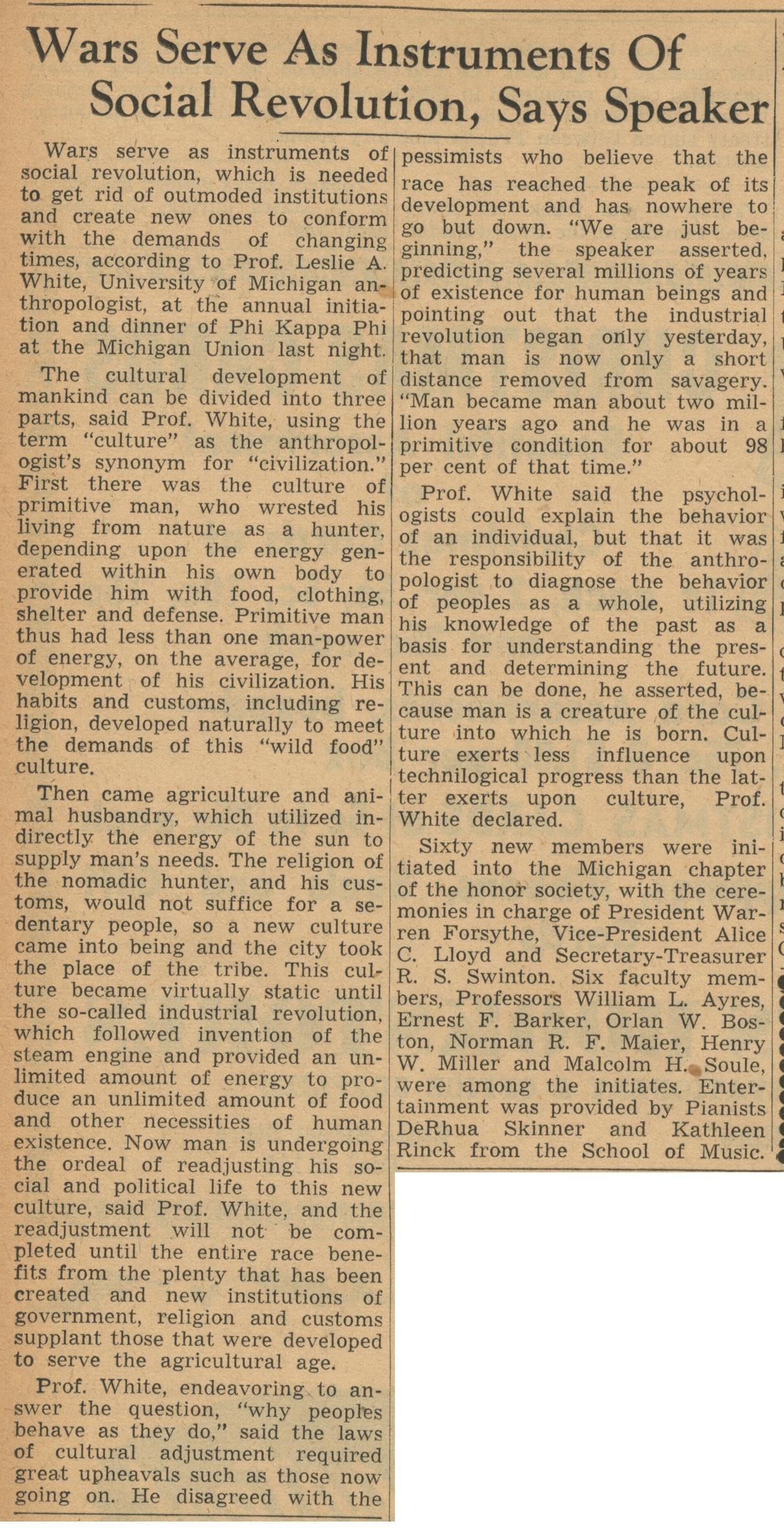Wars Serve As Instruments of Social Revolution, Says Speaker

Wars Serve As Instruments Of Social Revolution, Says Speaker
Wars serve as instruments of social revolution, which is needed to get rid of outmoded institutions and create new ones to conform with the demands of changing times, according to Prof. Leslie A. White, University of Michigan anthropologis, at the annual initiation and dinner of Phi Kappa Phi at the Michigan Union last night.
The cultural development of mankind can be divided into three parts, said Prof. White, using the term “culture" as the anthropologist’s synonym for "civilization." First there was the culture of primitive man, who wrested his living from nature as a hunter, depending upon the energy generated within his own body to provide him with food, clothing, shelter and defense. Primitive man thus had less than one man-power of energy, on the average, for development of his civilization. His habits and customs, including religion, developed naturally to meet the demands of this "wild food" culture.
Then came agriculture and animal husbandry, which utilized indirectly the energy of the sun to supply man's needs. The religion of the nomadic hunter, and his customs, would not suffice for a sedentary people, so a new culture came into being and the city took the place of the tribe. This culture became virtually static until the so-called industrial revolution, which followed invention of the steam engine and provided an unlimited amount of energy to produce an unlimited amount of food and other necessities of human existence. Now man is undergoing the ordeal of readjusting his social and political life to this culture, said Prof. White, and the readjustment will not be completed until the entire race benefits from the plenty that has been created and new institutions of government, religion and customs supplant those that were developed to serve the agricultural age.
Prof. White, endeavoring, to answer the question, “why peoples behave as they do,” said the laws of cultural adjustment required great upheavals such as those now going on. He disagreed with the pessimists who believe that the race has reached the peak of its development and has nowhere to go but down. "We are just beginning," the speaker asserted, predicting several millions of years of existence for human beings and pointing out that the industrial revolution began only yesterday, that man is now only a short distance removed from savagery. "Man became man about two million years ago and he was in a primitive condition for about 98 er cent of that time."
Professor White said that psychologists could explain the behavior of an individual, but that it was the responsibility of the anthropologist to diagnose the behavior of peoples as a whole, utilizing his knowledge of the past as a basis for understanding the present and determining the future. This can be done, he asserted, because man is a creature of the culture into which he is born. Culture exerts less influence upon technological progress than the latter exerts upon culture, Prof. White declared.
Sixty new members were initiated into the Michigan chapter of the honor society, with the ceremonies in charge of President Warren Forsythe, Vice-President Alice C. Lloyd and Secretary-Treasurer R. S. Swinton. Six faculty members, Professors William L. Ayres, Ernest F. Barker, Orlan W. Boston, Norman R. F. Maier, Henry W. Miller and Malcolm H. Soule, were among the initiates. Entertainment was provided by Pianists DeRhua Skinner and Kathleen Rinck from the School of Music.
Article
Subjects
World War II
Lectures
University of Michigan - Faculty & Staff
University of Michigan - Fraternities & Sororities
Musicians
Old News
Ann Arbor News
Leslie A. White
Warren Forsythe
Alice C. Lloyd
R. S. Swinton
William L. Ayers
Ernest F. Barker
Orlan W. Boston
Norman R. F. Maier
Henry W. Miller
Malcolm H. Soule
DeRhua Skinner
Kathleen Rinck
Michigan Union